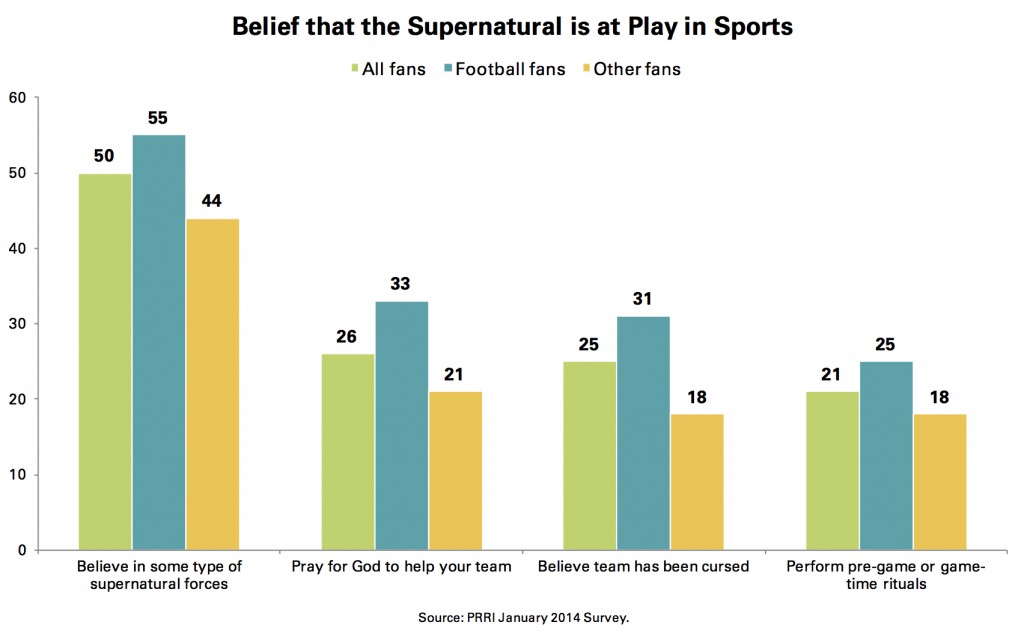Half of American Fans See Supernatural Forces at Play in Sports
I. What Role Does the Supernatural Plays in Sports?
Half of sports fans see some aspect of the supernatural at play in sports, meaning they either pray to God to help their team, have thought their team was cursed at some point in time, or believe that God plays a role in determining the outcome of sporting events.
 One-in-four (25%) Americans who report being a fan of a particular team believe that their team has been cursed at some point in time.
One-in-four (25%) Americans who report being a fan of a particular team believe that their team has been cursed at some point in time.
Midwest fans are substantially more likely than fans living in other regions to report that their team has been cursed. One-third of fans living in the Midwest say their team has been cursed, compared to 27% of fans living in the West, 22% of fans in the South, and 20% of fans in the Northeast.
There are few differences by religious affiliation. More than 1-in-5 white evangelical Protestant fans (22%), minority Protestant (22%) fans, religiously unaffiliated fans (25%), Catholic sports fans (27%), and white mainline Protestant fans (30%) believe their team has been cursed.
More than one-quarter (26%) of sports fans report having prayed for God to help their team, while more than 7-in-10 (73%) say they have never done this.
White evangelical Protestants (38%), white mainline Protestant (33%) and minority Protestant (29%) sports fans are considerably more likely than Catholic (21%) or religiously unaffiliated (15%) fans to say they have prayed for their team.
Southern (30%) and Midwestern fans (29%) are more likely to report praying to God for help than those fans living in the West (24%) or Northeast (20%).
Americans who report having prayed to God for their team are much more likely than those who have not to believe God plays a role in determining the outcomes of sporting events (37% vs. 12%).
Roughly 1-in-5 sports fans (19%) and similar numbers of all Americans (22%) believe that God plays a role in determining the outcomes of sporting events.
White non-Hispanic sports fans (12%) are less likely than non-white sports fans (30%) to believe that God plays a role in determining winners and losers in sports contests.
Among fans who believe that God plays a role in determining outcomes, a majority (52%) say they have prayed to God to help their team. Roughly 1-in-5 (21%) American sports fans report performing a ritual before or while watching their favorite team.
The majority (66%) of the rituals performed by fans involve wearing team jerseys or clothing with the team’s colors on them, though some fans report more creative apparel choices. One fan reports that he wears “a dirty pair of underwear… over my pants and then I put my jersey on.” Roughly one-quarter (24%) of fans who report having a ritual describe some type of activity, such as dancing in a circle, sitting in the same seat, or talking to their television. Some activities are quite specific, like one fan’s report that he takes all the money out of his wallet and puts it in the right-hand pants pocket before every game.
Football fans stand out in their belief in the supernatural. Compared to other fans, football fans are more likely to see supernatural forces at work in their favorite sport (55% vs. 44%). Football fans are also more likely than other fans to say they pray for their team (33% vs. 21%), perform pre-game or game-time rituals (25% vs. 18%), or to believe that their team has been cursed (31% vs. 18%).
II. Most Americans Going to Watch the Super Bowl
A little more than two weeks before the Super Bowl, Americans appear very interested in football’s most important game. More than 7-in-10 (72%) Americans report they are likely to watch the game, including a slim majority (51%) who report they are very likely to watch. Interest in the Super Bowl this year is significantly greater than last year, when roughly two-thirds (66%) reported they were likely to watch the game, including 44% who said they were very likely to watch. There is less interest in other major sporting events being held this year, such as the 2014 Winter Olympics and World Cup soccer tournament.
Similar numbers of Americans report that they are likely to tune in to the Winter Olympics as the Super Bowl (68% vs. 72%), but fewer report being very likely to watch (35% vs. 51%).
Although men are more likely than women to report an interest in the Super Bowl (79% vs. 66%) and the World Cup (35% vs. 20%), men and women are equally likely to report an interest in the Olympics (69% vs. 69%).
Fewer than 3-in-10 (27%) Americans report that they are very or somewhat likely to watch the World Cup, which will be held this summer. More than 7-in-10 (72%) say they are unlikely to watch, including 56% who say they are very unlikely.
There is substantially greater interest in the World Cup among Catholics (42%), minority Protestants (33%), and the religiously unaffiliated (25%) than among white mainline Protestants (15%) and white evangelical Protestants (13%).
More than half (56%) of Hispanic Americans say they are very or somewhat likely to watch the World Cup, a significantly higher share than the number of black (30%) and white (20%) Americans who say the same.
When it comes to watching sports, football remains the undisputed favorite among Americans. Americans are roughly four times more likely to say that football is their favorite sport to watch (39%) as they are to say the same about basketball (10%), baseball (9%), soccer (7%), or ice hockey (7%). Roughly 1-in-10 (11%) Americans report that they do not follow or watch any type of sport. There are considerable differences in America’s sports watching preferences by age and racial and ethnic identity.
Young adults ages 18 to 29 (13%) are roughly twice as likely as Americans overall (7%) and four times as likely as seniors ages 65 and older (3%) to say soccer is their favorite sport to watch.
Hispanics are more likely to prefer watching soccer (26%) to football (22%), baseball (13%) or basketball (14%). Black Americans are roughly twice as likely to prefer watching basketball than Americans overall (22% vs. 10%). And among white Americans, football is most popular (44%), followed by baseball (10%) and basketball (8%).
Six-in-ten (60%) Americans consider themselves fans of a particular sports teams. There are few differences by basic demographic groups, though men are somewhat more likely than women to report following a team (65% vs. 56%).
III. Any Given Sunday: Football or Church?
On any given Sunday, one-quarter (25%) of Americans report that they are more likely to be in church than watching football, while nearly as many (21%) say the opposite—that they are more likely to be watching football than in church. Roughly 1-in-5 (21%) Americans say they are likely to be doing both, while one-third (33%) say they are not likely to be doing either.
More than 4-in-10 (41%) black Americans say they are more likely to be in church on Sunday than to be watching football, more than three times the number who say the reverse (12%). About one-third (31%) say they are more likely to be doing both, and only 16% say they are not likely to be doing either. The numbers of white non-Hispanic Americans who say they are more likely to be in church versus those who say they’re more likely to be watching football are roughly comparable (23% vs. 22%), while 1-in-5 (20%) say they are likely to be doing both, and 35% say they would likely not be doing either. The pattern among Hispanics is nearly identical to non-Hispanics whites.
Nearly half (46%) of white evangelical Protestants say they are more likely to be in church than watching football, while only 9% say the reverse—that they would be more likely to be watching football. Roughly one-third (31%) say they are likely to be doing both. In contrast, white mainline Protestants are about twice as inclined to say they are more likely to be watching football on any given Sunday than spending time in church (27% vs. 15%). Nearly 4-in-10 (38%) say they are not likely to be doing either. Catholics are about as likely to say they would be in church (25%) as to say they would be watching football (23%), while minority Protestants are more than six times more likely to say they would be in church (49%) than watching football (8%) on any given Sunday.
Americans are about evenly divided on the question of whether God rewards athletes who have faith with good health and success (48% agree, 47% disagree).
More than 6-in-10 white evangelical Protestants (62%) and minority Protestants (65%) believe that God rewards athletes who have faith with good health and success. Half (50%) of Catholics, 44% of white mainline Protestants and only 22% of religiously unaffiliated Americans believe that God rewards athletes who have faith.
Recommended citation:
Jones, Robert P., Daniel Cox, and Juhem Navarro-Rivera. “Half of American Fans See Supernatural Forces at Play in Sports.” PRRI. 2014. http://www.prri.org/research/jan-2014-sports-poll/.





